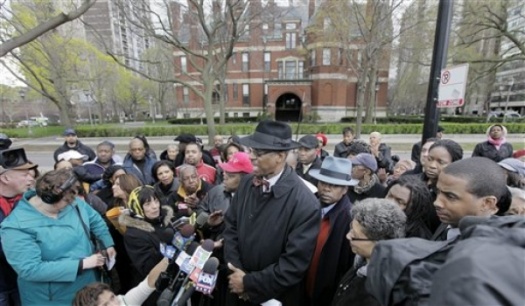
It was a scene familiar to anyone who has followed the Rev. Michael Pfleger over the years: Several dozen parishioners from his largely African American church on Chicago’s South Side piled off a bus to stage a protest.
CHICAGO (AP) — It was a scene familiar to anyone who has followed the Rev. Michael Pfleger over the years: Several dozen parishioners from his largely African American church on Chicago’s South Side piled off a bus to stage a protest. This time, though, it wasn’t a store that sells drug paraphernalia to kids or the studio where Jerry Springer tapes his television show. It was the home of the cardinal who suspended Pfleger because he hasn’t been willing to accept a transfer. Cardinal Francis George wrote a terse letter Wednesday, saying he was suspending Pfleger because the priest told reporters he would leave the Catholic Church if he were removed from St. Sabina to run a high school. In the hour that parishioners spent protesting outside George’s home Thursday, what came out was a mixture of anger, disappointment and confusion about the way their black church with the white priest was being treated. "This whole thing has been founded on disrespect," said Pfleger’s assistant, Vince Clark. "We’ve never felt respected by the Archdiocese of Chicago, never felt respected by Cardinal George and this is just another slap in the face." They pointed to the long and often contentious relationship Pfleger, a prominent social activist, and George. They said it appears Pfleger has been treated more harshly than other priests. He was suspended previously by the cardinal, in 2008 over disparaging comments about then Sen. Hillary Clinton. "He’s never taken any money, been an alcoholic, fondled any little boys," said Kimberly Lymore, an associate minister at St. Sabina. "Why is he being suspended for something that has been misinterpreted?" They also said they don’t know why the archdiocese seems so intent on moving Pfleger, who has been at the church for more than 30 years. Not only has he transformed a struggling church with no more than a few dozen people in the pews on Sunday into a thriving one with about 2,000 members that’s packed with worshippers every week, but he has helped restore the neighborhood. "You couldn’t walk down the street (when Pfleger arrived) with all the gangs and drugs and now you have a vitalized community, you see business coming back," said Olivia Watkins, 65. "Why would you destroy that?" Robert McClory, a former priest and retired Northwestern University journalism professor who wrote a biography about Pfleger, said the priest has confronted gang members, drug dealers and others he sees as a threat to the neighborhood. And Pfleger, who adopted a boy who was later gunned down on the street, receives calls each week to console parents whose children have been killed. They include Pam Bosley. "I reached out talk to Father Pfleger when I lost my son on April 4, 2006, to gun violence," Bosley said. "He lost a foster child so he understands the pain, the suffering that we are going through." What happens now is unknown. In his letter, George asked Pfleger to "take a few weeks to pray over your priestly commitments" but offered no details on when or if the two might meet. Pfleger didn’t return calls for comment and the archdiocese said George would not comment. Between Pfleger’s comments on a radio show in which he said if ordered to take the job at the high school he would "have to look outside the church," and George’s letter in which he said each priest is bound by his promise to "obey his bishop," McClory said it appears both men have painted themselves into corners. But, he said, George knows how popular Pfleger is and how much he has done for the parish. "The cardinal doesn’t want to go down as the bishop who killed or maimed the biggest black church in the city," he said. "Most likely they will reach some kind of accommodation so the cardinal won’t look like he’s completely giving in and Pfleger doesn’t look like he’s completely winning." Copyright 2011 The Associated Press. (AP Photo/M. Spencer Green)